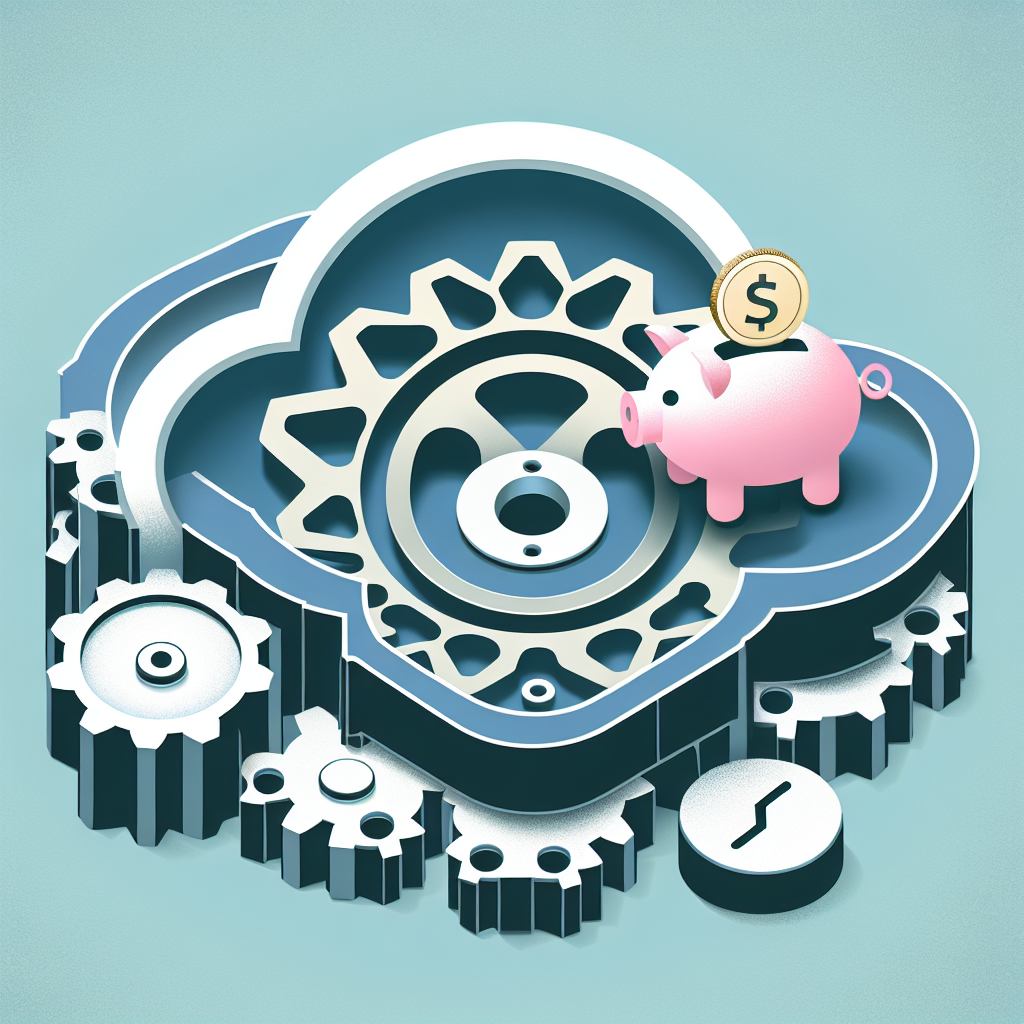Imagine a world where you no longer have to worry about managing and paying for idle server resources. A world where you only pay for the exact amount of computing power that you use. Well, that world is now a reality with Azure Functions Consumption Plan: A Cost-Effective Serverless Solution. This revolutionary platform allows you to run your applications and services without the need for dedicated servers, saving you both time and money. Say goodbye to unnecessary expenses and hello to a more efficient and cost-effective solution. Azure Functions Consumption Plan is the future of serverless computing, and it’s here to make your life easier.

What is Azure Functions Consumption Plan?
Azure Functions Consumption Plan is a serverless computing service offered by Microsoft Azure. It allows you to build and run applications without the need to provision or manage infrastructure. With the Consumption Plan, you only pay for the actual usage of your functions, making it a cost-effective solution for various use cases.
Definition
The Azure Functions Consumption Plan is based on the pay-per-use pricing model. This means that you are billed for the actual number of executions and the resources consumed by your functions. The plan automatically scales your functions based on the incoming load, ensuring that you have the required resources when needed.
How it Works
When you create an Azure Function App, you can choose the Consumption Plan as the hosting plan. Once your Function App is deployed, Azure will automatically manage the underlying infrastructure and handle the scaling for you. When a function is triggered, it is dynamically allocated resources to handle the workload. After the function execution is complete, the resources are released, and you are only billed for the actual execution time and resources used.
Benefits
The Azure Functions Consumption Plan offers several benefits:
-
Cost-Effectiveness: With the pay-per-use pricing model, you are only charged for the actual usage of your functions. This eliminates the need to pay for idle resources, making it a cost-effective solution for applications with varying workloads.
-
Scalability: The Consumption Plan automatically scales your functions based on the incoming load. This ensures that you have the necessary resources to handle high-demand periods without having to manually provision or manage additional infrastructure.
-
Reduced Management Overhead: With the Consumption Plan, you don’t need to worry about infrastructure management. Azure takes care of scaling, deployment, and maintenance, allowing you to focus on developing your application.
Getting Started with Azure Functions Consumption Plan
To get started with Azure Functions Consumption Plan, follow these steps:
Creating an Azure Function App
- Sign in to the Azure portal.
- Click on “Create a resource” and search for “Function App”.
- Select “Function App” from the results and click on “Create”.
- Provide a unique name for your Function App, choose a subscription, resource group, and hosting plan.
- Click on “Create” to deploy your Function App.
Configuring Consumption Plan
- Once your Function App is created, navigate to its overview page in the Azure portal.
- Click on “Platform Features” and then “Scale-out (App Service Plan)”.
- In the “Scale-out (App Service Plan)” page, select the “Consumption” plan as the hosting plan.
- Click on “Save” to apply the changes.
Setting up Triggers and Bindings
- In the Function App overview page, click on the “+” icon next to “Functions” to create a new function.
- Choose a template or create a custom function.
- Configure your desired trigger(s) and binding(s) for the function.
- Click on “Create” to deploy the function.

Understanding the Cost-Effectiveness of Azure Functions Consumption Plan
The Azure Functions Consumption Plan offers cost-effectiveness through its pay-per-use pricing model, dynamic scaling capabilities, and reduced management overhead.
Pay-Per-Use Pricing Model
With the Consumption Plan, you are billed only for the actual number of executions and the resources consumed by your functions. This means that you don’t have to pay for idle resources, resulting in cost savings for applications with varying workloads.
Dynamic Scaling
The Consumption Plan automatically scales your functions based on the incoming load. This ensures that you have the necessary resources to handle high-demand periods without the need to manually provision or manage additional infrastructure. As the workload decreases, the plan scales down the resources, further optimizing costs.
Reduced Management Overhead
With the Consumption Plan, Azure takes care of the underlying infrastructure management, including scaling, deployment, and maintenance. This reduces the management overhead for developers, allowing them to focus on building and improving their applications.
Key Features of Azure Functions Consumption Plan
The Azure Functions Consumption Plan offers several key features that enhance its functionality and usability.
Automatic Scaling
The Consumption Plan automatically scales your functions based on the incoming load. This ensures that you have the required resources to handle varying workloads without the need for manual intervention. The plan scales up and down as needed, optimizing resource utilization and providing a seamless experience for your users.
Event-driven Programming
Azure Functions in the Consumption Plan are designed for event-driven programming. This means that your functions can react to events from various sources, such as messages, timers, and HTTP requests. This allows you to create highly responsive and efficient applications that can process events in near real-time.
Integration with Azure Services
The Consumption Plan seamlessly integrates with other Azure services, allowing you to build complex applications that leverage the power of the Azure ecosystem. You can easily connect your functions to services such as Azure Storage, Azure Cosmos DB, Azure Event Hubs, and more, enabling you to create robust and scalable solutions.

Use Cases for Azure Functions Consumption Plan
The Azure Functions Consumption Plan is suitable for a wide range of use cases across different industries. Here are a few examples:
Web and Mobile Applications
Azure Functions Consumption Plan can be used to build serverless backends for web and mobile applications. It scales automatically to handle the incoming traffic, ensuring that your application remains responsive even during peak periods. With its event-driven nature, you can easily integrate with APIs, databases, and other services to create a complete solution.
IoT Data Processing
With its ability to handle events, Azure Functions Consumption Plan is an ideal choice for processing and analyzing IoT data. You can configure your functions to react to incoming messages from devices and perform real-time analytics, filtering, and aggregation. This allows you to gain valuable insights from your IoT data and take timely actions.
Real-time Analytics
Azure Functions Consumption Plan can be used to process and analyze real-time data from various sources. You can configure your functions to react to events such as incoming messages, changes in data, or scheduled triggers. This enables you to perform real-time analytics, generate notifications, and trigger actions based on the analyzed data.
Limitations and Considerations
While Azure Functions Consumption Plan offers many benefits, there are a few limitations and considerations to keep in mind.
Maximum Execution Timeout
Azure Functions running in the Consumption Plan have a maximum execution timeout of 5 minutes. If your functions require longer execution times, you should consider using other Azure Functions plans that offer higher execution limits.
Concurrency Limits
The Consumption Plan has certain concurrency limits that restrict the number of simultaneous executions. This means that if your functions experience high concurrency, there may be a delay in processing. If your application requires high concurrency, you should consider using other Azure Functions plans that offer higher concurrency limits.
Cold Start Delay
Azure Functions in the Consumption Plan may experience a cold start delay when there is no incoming workload for a certain period. This means that the first execution of a function after a period of inactivity may take longer than subsequent executions. While this delay is minimal, it can be a consideration for applications that require near-instantaneous responsiveness.

Comparing Consumption Plan with Other Azure Functions Plans
Azure Functions Consumption Plan is just one of the hosting plans available for Azure Functions. Here’s a comparison between the Consumption Plan and the Premium Plan.
Consumption Plan vs. Premium Plan
-
The Consumption Plan is a serverless offering where you only pay for the actual usage of your functions. The Premium Plan provides dedicated instances and offers enhanced performance and features but comes with a monthly cost.
-
The Consumption Plan automatically scales your functions based on the incoming load, while the Premium Plan allows you to manually configure scaling settings.
-
The Premium Plan offers advanced features such as VNET integration, virtual network access, and more control over function execution environment, which may be beneficial for certain use cases.
Cost Comparison
In terms of cost, the Consumption Plan is more suitable for applications with varying workloads, as you only pay for the actual usage. The Premium Plan provides more predictable costs for applications with consistent or high-demand workloads.
Performance Differences
While both plans offer scalability, the Premium Plan provides dedicated instances and resources, which can result in better performance and lower cold start times compared to the Consumption Plan. If your application requires higher performance guarantees or reduced cold start times, the Premium Plan may be more suitable.
Security and Compliance
Azure Functions Consumption Plan provides various security and compliance features to protect your applications and data.
Data Protection
Azure Functions supports data encryption at rest and in transit. You can configure HTTPS endpoints for your functions to ensure secure communication. Additionally, Azure Key Vault integration allows you to securely store and manage secrets and keys used in your functions.
Regulatory Compliance
Azure Functions Consumption Plan is built on Azure, which complies with various industry and regional regulations, including GDPR, HIPAA, ISO, and SOC. By leveraging Azure’s compliance offerings, you can ensure that your applications meet the necessary regulatory requirements.
Access Controls
Azure Functions offers role-based access control (RBAC), allowing you to define fine-grained access policies for your functions. You can specify who has permission to create, read, update, and delete resources within your Function App.

Monitoring and Troubleshooting Azure Functions Consumption Plan
Azure Functions Consumption Plan provides several monitoring and troubleshooting tools to help you monitor the health and performance of your functions.
Log Analytics Integration
You can integrate your Azure Functions with Log Analytics, which allows you to collect, analyze, and visualize logs from your functions. By leveraging Log Analytics queries and dashboards, you can gain insights into the behavior of your functions and troubleshoot any issues.
Application Insights
Azure Functions Consumption Plan seamlessly integrates with Application Insights, which provides deep monitoring capabilities for your functions. You can track function performance, detect performance bottlenecks, and receive alerts based on predefined thresholds.
Diagnostic Tools
Azure Functions Consumption Plan also offers built-in diagnostic tools that help you troubleshoot and identify issues. You can enable diagnostic logging, which provides detailed logs about function executions, errors, and dependencies. You can also use the Azure portal to monitor the execution status of your functions and review any error messages.
Best Practices for Optimizing Azure Functions Consumption Plan
To optimize your Azure Functions Consumption Plan and ensure optimal performance, consider the following best practices:
Optimizing Function Code
-
Follow best practices for function design and development, such as adhering to SOLID principles, keeping functions small and focused, and using efficient algorithms.
-
Leverage asynchronous programming patterns to maximize the throughput of your functions and improve responsiveness.
Applying Caching Strategies
-
Use caching mechanisms such as Azure Cache for Redis or Azure Blob Storage to cache frequently accessed data. This can help reduce the execution time of your functions and improve performance.
-
Consider implementing request/response caching to cache the output of your functions. This can eliminate the need to execute the function for duplicate requests, further optimizing performance.
Monitoring and Performance Tuning
-
Regularly monitor the performance of your functions using the available monitoring and diagnostic tools. Identify any bottlenecks or performance issues and take appropriate actions to optimize performance.
-
Review and fine-tune the configuration settings of your Function App, such as the number of instances and concurrency limits, to ensure optimal resource usage and scalability.
By following these best practices, you can ensure that your Azure Functions Consumption Plan performs efficiently and meets the needs of your application.
In conclusion, Azure Functions Consumption Plan is a cost-effective serverless computing solution offered by Microsoft Azure. With its pay-per-use pricing model, dynamic scaling capabilities, and reduced management overhead, it provides an efficient way to build and run applications. Whether you are developing web and mobile applications, processing IoT data, or performing real-time analytics, the Consumption Plan offers the flexibility and scalability you need. By understanding its features, limitations, and best practices, you can leverage Azure Functions Consumption Plan effectively to meet your application requirements.
